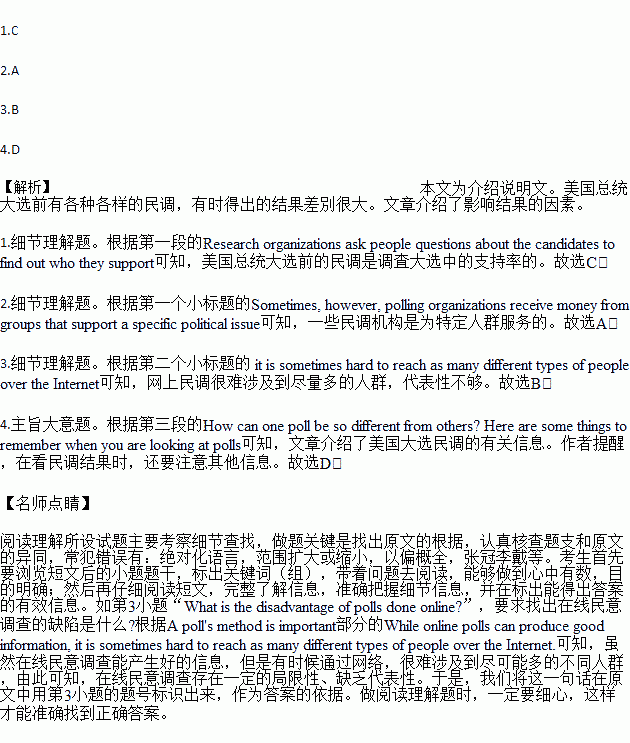题目内容
Every four years on November 8, the American people will vote for the next U. S. president. Before election day, people following the presidential campaign will see many polls (民调). A poll is a public opinion study. Research organizations ask people questions about the candidates to find out who they support.
For example, one of the poll is run by a professor at a university in the U.S. state of Connecticut. People who work for the polling service call likely voters on the telephone.
How can one poll be so different from others? Here are some things to remember when you are looking at polls:
Not all polling groups are the same
Some polls target specific groups of people. Many polls make sure they collect many different opinions. Sometimes, however, polling organizations receive money from groups that support a specific political issue. It is important to look at which group carried out the poll along with the results.
A poll's method is important
Some polls are using new technology. Traditionally, polls are done over the phone. But that is slowly changing. Many polls are now done online. While online polls can produce good information, it is sometimes hard to reach as many different types of people over the Internet.
Also important the size of the poll. Try to find out how many people were polled before believing its results.
Polls are not predictions(预测)
Polls only show how people feel at one moment in time. They do not show what will happen in the future. Public opinion may change before the general election on November 8. Some things that could change the opinions of voters include: the debates on television, the release of the candidates’ tax or medical records, and unexpected illnesses.
1.What do political polls in the U. S. try to do?
A. Call on people to be active in the election.
B. Help political parties to win the election.
C. Find out the support rate in the election.
D. Affect people's opinions in the election.
2.What do you know about polling organizations?
A. Some serve for certain groups. B. They all collect different opinions.
C. They all make money from their polls. D. All of them try to find the correct results.
3.What is the disadvantage of polls done online?
A. People may refuse to respond. B. Results sometimes lack of representation.
C. Only the young give their ideas. D. People refuse to tell their true thoughts.
4.What can be a suitable title for the text?
A. Effects of Political Polls in the U. S..
B. Various Kinds of Political Polls in the U. S..
C. Ways to Carry Out Political Polls in the U. S..
D. Things to Know About Political Polls in the U. S..

